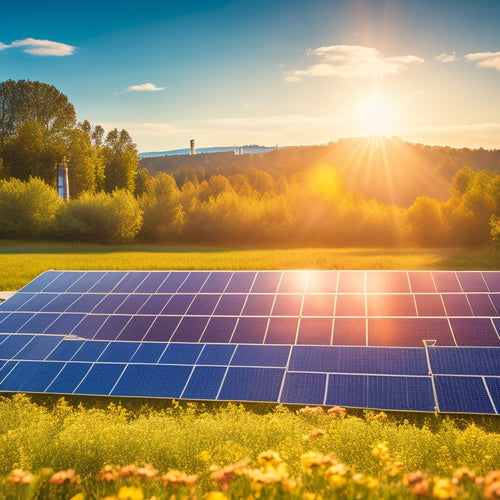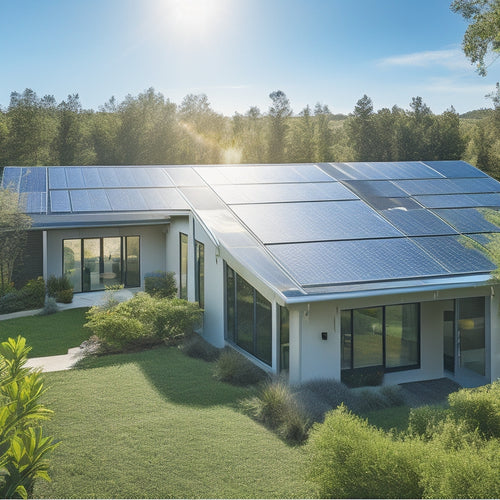
How Long Do Residential Solar Panels Last
Share
Residential solar panels typically last between 25 to 30 years, ensuring durability and long-term performance. Many panels come with strong warranties, covering both products and energy output for decades. This investment not only reduces your energy bills considerably but also enhances your property's value. Their efficient design withstands harsh weather conditions, guaranteeing reliable performance in extreme temperatures or storms. With minimal maintenance required, you can enjoy hassle-free energy savings. As you investigate your options, you'll uncover further understanding into maximizing your investment and grasping different warranty types.
At a Glance
- Residential solar panels typically last 25 to 30 years, depending on the manufacturer and technology used.
- Most panels come with warranties ranging from 10 to 30 years, covering performance and defects.
- Regular maintenance, including cleaning and inspections, helps ensure optimal performance over their lifespan.
- High-efficiency panels maximize energy production and minimize wear, enhancing longevity.
- Durability features enable panels to withstand extreme weather conditions, contributing to their long lifespan.
Superior Energy Efficiency Ratings
When considering residential solar panels, energy conversion efficiency is essential for maximizing your investment. Higher efficiency ratings not only enhance performance but also contribute to the longevity of your system.
By choosing panels with superior energy efficiency, you guarantee peak energy production over their lifespan. Additionally, advancements in solar technology continuously improve energy conversion rates, allowing homeowners to benefit from greater energy independence and reduced carbon footprints.
Investing in durable solar panels can also address fragility issues seen in traditional solar cells, further enhancing the value of your investment.
Energy Conversion Efficiency
Energy conversion efficiency is a critical factor to assess when evaluating residential solar panels, as it directly impacts your potential energy savings and return on investment. Higher efficiency means that more sunlight gets converted into usable electricity, reducing your reliance on the grid and lowering your utility bills.
With advancements in solar technology, many panels now boast efficiency ratings of over 20%, which is a significant improvement compared to older models.
When choosing solar panels, consider their energy conversion rates. Higher efficiency panels might come at a premium, but they often pay off in the long run through greater energy production. Depending on your roof space and energy needs, investing in superior efficiency can maximize your energy output even in limited areas.
Additionally, understanding energy conversion efficiency helps you gauge the sustainability of your investment. The more effectively your solar panels convert sunlight, the sooner you'll recoup your costs and enjoy clean, renewable energy.
Ultimately, selecting high-efficiency solar panels enables you to take control of your energy future, granting you the freedom that comes with energy independence. Make informed choices that align with your values and goals.
Longevity and Performance
Superior energy efficiency ratings not only enhance your energy savings but also play a significant role in the longevity and performance of residential solar panels. When you invest in high-efficiency panels, you're choosing technology that maximizes energy output while minimizing stress on the system. This balance is essential for extending your solar panel lifespan.
To guarantee your panels perform at their best, regular maintenance is key. Follow these maintenance tips to keep your system running smoothly.
First, clean your panels a couple of times a year to remove dirt, debris, and other obstructions that may hinder sunlight absorption.
Next, inspect for any signs of wear or damage, including loose connections or cracks. Addressing these issues promptly can prevent larger problems down the line.
Additionally, consider monitoring your system's performance regularly. If you notice a drop in efficiency, it could indicate underlying issues that need attention.
By taking these steps, not only will you enhance your energy independence, but you'll also make certain that your solar panels remain effective for years to come.
Investing in superior energy efficiency ultimately pays off, allowing you the freedom to enjoy sustainable energy without worry.
Long-Term Cost Savings
When you invest in residential solar panels, you can expect significant long-term cost savings.
Solar panels can reduce energy costs by 50-75%, saving homeowners between $400 and $1,000 annually.
Not only will you see reduced energy bills, but your property value is likely to increase as well increased property value.
This dual benefit makes solar energy not just an eco-friendly choice, but a smart financial decision for your home.
Reduced Energy Bills
One of the most appealing benefits of installing residential solar panels is the significant reduction in your energy bills. By utilizing renewable resources, you can generate your own electricity and reduce your reliance on the grid. This shift not only lowers your monthly expenses but also provides you with a sense of grid independence that many homeowners crave.
As energy prices continue to rise, having solar panels means you're less affected by fluctuations in utility rates. You'll enjoy predictable energy costs, which can lead to substantial long-term savings. Over time, the initial investment in solar technology pays off as you watch your energy bills decrease, allowing you to allocate those savings elsewhere.
Moreover, solar panels often come with warranties that last for decades, ensuring your investment remains sound. You'll also contribute to a cleaner environment, making a positive impact while saving money.
Increased Property Value
Investing in residential solar panels can greatly enhance your property's value over time. As market demand for sustainable energy solutions increases, buyers often look for homes equipped with solar technology. This growing interest can considerably impact your property's appraisal, leading to higher resale values.
| Factors | Impact on Property Value |
|---|---|
| Solar Panel Age | Newer panels yield higher appraisals |
| Energy Savings | Lower utility costs appeal to buyers |
| Environmental Appeal | Attracts eco-conscious homebuyers |
| Local Incentives | Tax credits can enhance perceived value |
When you install solar panels, you're not just reducing energy bills; you're making a strategic investment in your home. Potential buyers value the long-term cost savings associated with solar energy, making your property more attractive in a competitive market. With increasing awareness of environmental sustainability, your home can stand out, appealing to a broader audience. In the end, solar panels not only provide immediate financial benefits but also serve as a long-term strategy for increasing your property value, making it a smart choice for any homeowner seeking freedom from rising energy costs.
Durability Against Harsh Weather
When considering solar panels for your home, you need to understand their weather resistance features.
These panels are engineered to withstand extreme conditions, from heavy snow to intense heat, ensuring they remain functional and efficient.
Rigorous testing includes evaluations for performance assurance in extreme conditions, such as thermal cycling and wind tunnel assessments.
Investing in durable solar technology means you're protected against potential damage and can enjoy long-term reliability regardless of the weather.
Weather Resistance Features
Residential solar panels are engineered to withstand a variety of harsh weather conditions, ensuring their longevity and reliability. With features designed for storm resistance, these panels can endure high winds, heavy rain, and hail, so you don't have to worry about damaging your investment.
Many manufacturers test their products to meet stringent industry standards, guaranteeing that your panels remain intact during severe weather events.
Temperature tolerance is another vital aspect of solar panel durability. These systems are built to perform efficiently in both extreme heat and cold, maximizing energy production regardless of the climate.
When you install solar panels, you gain peace of mind knowing they can handle the elements, allowing you to enjoy a sustainable energy source without frequent maintenance or replacement.
Impact of Extreme Conditions
While weather resistance features are vital for solar panel performance, their durability against extreme conditions is equally important. You want a system that can withstand extreme temperatures, high humidity effects, and potential storm damage.
Solar panel resilience becomes necessary, especially in areas prone to natural disasters like hurricanes or heavy snowfall. Manufacturers design panels to endure these challenges, using tempered glass and sturdy framing to resist impacts from hail and debris.
It's essential to choose solar panels that have undergone rigorous testing, ensuring they can withstand environmental factors that threaten their integrity. For instance, panels rated for high wind loads can better survive strong gusts, while those with good temperature coefficients will perform efficiently even in sweltering heat.
You deserve a solar energy system that not only captures the sun's power but also stands strong against nature's fury. By investing in high-quality solar panels, you're securing your energy freedom and safeguarding your investment for decades to come.
The right choice today can mean less worry tomorrow, allowing you to enjoy the benefits of renewable energy without fear of damage from the elements.
Selecting Based on Warranty Length
When choosing solar panels, understanding the different types of warranties is vital for your investment. A longer warranty duration often indicates greater confidence in the product's longevity and performance.
Additionally, the quality of materials used in solar panels can greatly affect their lifespan, making it important to evaluate the key components of a solar power system.
Understanding Warranty Types
In evaluating solar panel options, understanding the various warranty types can significantly impact your investment decision. When you invest in solar energy, you want to guarantee that your system is protected for the long haul.
Typically, warranties fall into two categories: product warranties and performance warranties. Product warranties cover defects in materials and workmanship, often lasting 10 to 25 years. Performance warranties guarantee a certain level of energy production over time, commonly spanning 25 years.
It's important to assess the warranty coverage offered by different manufacturers. A longer warranty often indicates confidence in the product's durability and reliability.
Additionally, examine the claim process; a straightforward, transparent process can save you time and hassle if issues arise. Some companies may have stringent requirements, making it difficult to file a claim.
Importance of Warranty Duration
Choosing the right solar panel isn't just about efficiency and cost; warranty duration plays an essential role in your decision-making process. A solid warranty will give you peace of mind, guaranteeing that your investment is protected for years to come. When evaluating solar panels, consider the warranty coverage offered by the manufacturer. A longer warranty often reflects a manufacturer's confidence in their product's durability and performance.
Here's a quick comparison of warranty durations from various manufacturers:
| Manufacturer | Warranty Duration | Coverage Type |
|---|---|---|
| Manufacturer A | 25 Years | Performance & Product |
| Manufacturer B | 20 Years | Product Only |
| Manufacturer C | 30 Years | Performance Only |
| Manufacturer D | 15 Years | Limited Coverage |
The manufacturer reputation also matters. Well-established brands tend to provide more dependable warranties, which can translate to better long-term performance. By selecting a solar panel with a strong warranty, you're not just buying a product; you're investing in your energy independence and financial freedom. Prioritize warranty duration to guarantee you're making a smart choice for your home.
Lower Maintenance Requirements
When you invest in residential solar panels, you'll appreciate their minimal upkeep requirements.
Typically, they only need occasional cleaning and inspections to guarantee peak performance.
This low maintenance nature not only saves you time but also reduces long-term costs associated with energy production.
Minimal Upkeep Needed
Solar panels require minimal upkeep, making them a smart investment for homeowners looking to reduce energy costs without the hassle of extensive maintenance. Once installed, solar panels are designed to be durable and efficient, needing only routine inspections to guarantee peak performance.
Most issues can be resolved quickly and easily, allowing you to focus on enjoying your energy savings rather than worrying about ongoing upkeep.
In terms of panel cleaning, you'll find that rain often does the job for you by washing away dirt and debris. However, if you live in a particularly dusty area or have a significant bird presence, you might want to clean your panels a couple of times a year. This simple task can improve efficiency and prolong the life of your system.
With minimal maintenance requirements, solar panels truly offer you the freedom to utilize renewable energy without burdensome commitments.
You'll spend less time managing your energy source and more time enjoying the benefits, including reduced utility bills and a smaller carbon footprint. By investing in solar, you're choosing a hassle-free path to energy independence.
Frequently Asked Questions
How Do Solar Panel Brands Compare in Longevity?
When comparing solar panel brands, you'll find significant differences in brand reliability and performance comparison. Investing in reputable brands guarantees longer-lasting efficiency, enabling you to utilize clean energy and achieve greater independence from traditional power sources.
Do Solar Panels Degrade Over Time?
Yes, solar panels do degrade over time. Typically, you'll see a gradual performance decline, which can affect their overall solar panel lifespan. Regular maintenance can help guarantee peak efficiency and extend their productive years considerably.
Can I Install Solar Panels Myself?
You can install solar panels yourself, but consider installation requirements and DIY considerations. Make certain you understand local regulations, electrical connections, and safety measures. With the right knowledge, you'll gain energy independence and reduce costs.
What Happens if My Solar Panels Get Damaged?
If your solar panels get damaged, you'll need solar panel repairs. Check your insurance coverage, as it may help cover costs. Staying proactive guarantees your system remains efficient and your energy independence continues uninterrupted.
Are There Tax Incentives for Installing Solar Panels?
Did you know solar panel installations can qualify for up to 26% in federal credits? Plus, many states offer additional rebates. These incentives make your investment more affordable, enhancing your energy independence and long-term savings.
Explore More
Just like a sturdy tree weathering storms, your residential solar panels can stand the test of time, providing energy and savings for years to come. By choosing high-efficiency models with strong warranties, you're planting seeds for long-term benefits. With minimal upkeep, these panels are designed to endure, much like nature's resilience. Investing in solar isn't just about today's costs; it's about nurturing a sustainable future. So, welcome this renewable energy path and watch your savings grow.
Related Posts
-

Advantages of Solar Generating Systems Over Traditional Energy
Solar generating systems provide several key advantages over traditional energy sources. You'll experience lower long...
-

Designing a Green Roof for Maximum Energy Efficiency
Designing a green roof for maximum energy efficiency involves several key strategies. Start by selecting native, drou...
-

Installing Metal Solar Roofs for Maximum Energy Efficiency
Installing metal solar roofs can drastically enhance your home's energy efficiency and durability. These roofs withst...


